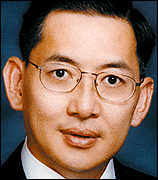

![]()
Pacific Perspective


![]()
Pacific Perspective
Seventeen country members of the Asian Productivity Organization (APO) are meeting this week in Honolulu to report on the status of e-commerce in their economies. E-commerce is
opportunity for
Asia to catch upThe APO was founded in 1960, about the time that economists first began to recognize the role of technology in economic growth.
For the last half-decade, Asian leaders have proclaimed that information technology was going to be the main driver for the next wave of the economic miracle.
The Nasdaq debacle has started to be felt around the world and Asia is not immune. Dot-com hopefuls -- such as the well-respected Sina.com, once touted as the Yahoo! of China -- have suffered many financial setbacks.
Additionally, as the APO delegates have pointed out, the role of the Internet on national and regional economies remains minimal in most of Pacific Asia. As such, the impacts of the financial meltdown have been rather isolated.
Asia today has made substantial progress in the capacity building of national information infrastructures and e-business.
Still, with the exception of Australia, Chinese Taipei, Japan, Singapore, and Hong Kong, Internet deployment and use are still in the infancy stage.
Most applications of e-business are the privilege of the few brick-and-mortar companies that try to use Internet technology to expand their successful exports.
Actually, the slowdown of Internet commerce growth in the United States and elsewhere should present a rare opportunity for Asian countries to try to catch up to their Western counterparts with e-commerce.
The old adage "the misfortune of someone else is the fortune of others" seems to be the case here.
Due to slower global demand of computer, network, and telecommunication equipment, the supply for hardware and software is more abundant and more affordable for developing countries and the recruitment for information technology personnel is less cutthroat.
More importantly, the abrupt halt of the dot.coms miracle worldwide should give Asian companies more time to intensify their capacity building effort -- that is to catch up at a more cost-effective pace with developing e-commerce business strategies and to be less concerned by the brain drain.
Sponsored by the State of Hawaii Department of Business, Economic Development and Tourism, the APO delegates are also meeting with government, business and academic leaders in Hawaii to learn more about e-commerce technology in the United States and in the Aloha State.
If Asian economies succeed in taking advantage of the current supply plethora of the information technology sector to intensify their capacity building effort, their infrastructure, and e-business competitiveness, this could be good news for Asia-bound businesses in Hawaii.
It always pays to do business with better-equipped, better-informed, and better-trained business partners.
Tung Bui is Matson Navigation Distinguished Professor of Global Business at the University of Hawaii at Manoa's College of Business Administration. Reach him at: tbui@cba.hawaii.edu.